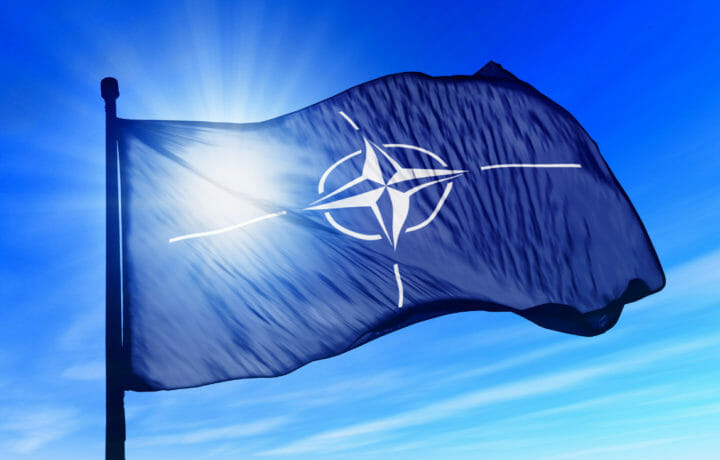Last month, Turkish President Recep Tayyip Erodgan sought to build closer relations with NATO ally Spain, and that included the purchase of a second aircraft carrier, and possibly a submarine. The two nations had previously cooperated on the construction of a Spanish amphibious assault ship.
“The first aircraft carrier was not a large-scale one. We have agreed on the construction of a large scale (carrier,)” Erdogan said at a joint news conference with visiting Spanish Prime Minister Pedro Sanchez, adding, “And perhaps, we will also enter (cooperation) for a submarine. There is so much we can do in the defense industry, including (concerning) armed and unarmed unmanned aerial vehicles.”
Such close ties among European allies would normally be seen as a good thing, especially as Russia has built-up its forces along the Ukrainian border – a fact that remains a concern to NATO member states, including Turkey. However, regional politics are a complex issue, and another NATO member has expressed apprehension that Ankara is moving closer with Madrid.
Just last week, Greek Foreign Minister Nikos Dendias voiced worries that Turkey, Athens’ regional rival, was forcing such a bond with another NATO partner. Following talks with Spanish Foreign Minister José Manuel Albares in the Greek capital, Dendias told reporters, “I expressed concern over Spain’s possible intention to strengthen its military cooperation with Turkey.”
The Greek minister added that European Union members have agreed not to export military technology that could be used for “aggressive acts or regional destabilization,” and declared “Turkey is a destabilizing factor in the Eastern Mediterranean.”
Relations between the two, Athens and Ankara, have long been tenuous – Greece was under control of the Ottoman Empire, the predecessor to modern Turkey, since the 15th century and only obtained independence in the 1830s. The nations have fought a series of wars, and were on opposing sides during the First World War.
Turkey, which became a republic after the dissolution of the Ottoman Empire after the war, was neutral until the very end of the Second World War, while Greece was occupied by Nazi Germany. Both nations became NATO members on February 18, 1952 and over the last nearly 60 years have never been what could be called close friends – but there have been periods of reconciliation, notably after earthquakes in 1999 caused serious damage in both countries.
Tensions have risen again deteriorated over the past year and a half over undersea exploration rights in the Eastern Mediterranean and migration issues.
Greece’s Navy Expansion
The comments made about Turkish aggression by the Greek foreign minister also come as Athens has embarked on its own efforts to modernize its air force and navy, and that has included major purchases from France.
Additionally, this month the U.S. State Department had notified Congress that it had approved a $9.4 billion sale to upgrade the Greek Navy, including the $6.9 billion purchase of four Lockheed Martin-manufactured, multi-mission surface combatant ships dubbed “Hellenic Future Frigates.”
The remaining $2.5 billion component of the sale would go towards updating and enhancing four MEKO-class frigates already in service with the Hellenic Navy.
Greece had reportedly awarded the contract to the U.S. defense contractor after Athens had courted international offers to modernize its navy.
“The proposed sale will improve Greece’s capability to meet current and future threats by providing an effective combatant deterrent capability to protect maritime interests and infrastructure in support of its strategic location on NATO’s southern flank,” the State Department said in a statement.
Balance of Power
The United States has sought to maintain close relations with both of its regional NATO allies, but Washington and Ankara have faced their own respective rift. Turkey was expelled from the F-35 Joint Strike Fighter program in 2019 after Ankara moved forward with its purchase of the Russian-built S-400 “Triumf” air-defense system.
NATO officials, as well as the U.S. White House, insisted that the Russian system was not compatible with the fifth-generation fighter, and voiced concern that it posed a threat to the security of the F-35. Turkey had rejected that argument. Since then Turkey has pushed the U.S. to sell Ankara F-16 Fighting Falcon jet fighters to update its air force, an issue that President Erdogan had raised with U.S. President Joe Biden when they met in October.
While relations have remained strained between Ankara and Washington, last week Turkish Foreign Minister Mevlut Cavusoglu announced in Turkish parliament at the beginning of the week that Turkey would normalize ties with Armenia, a move that has been pressed by the White House.
“We will mutually appoint envoys as part of normalization steps with Armenia,” said Cavusoglu, who added that Ankara would next coordinate its steps with Azerbaijan.



